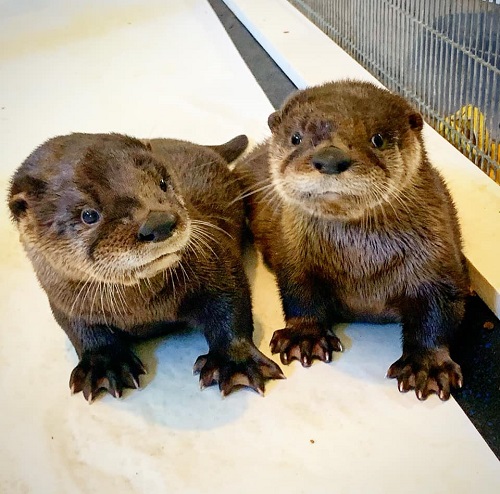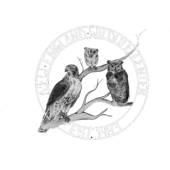
They were meant for each otter…
This baby season we have the opportunity to care for two orphaned North American river otters. Special permission by Mass Wildlife is required to rehabilitate this species and Cape Wildlife is currently the only facility permitted to care for them long term. These animals can become habituated to humans if not raised in pairs so combining them is always best practice.
Our otters, one male and the other female, were both singletons found off cape by local rehabilitators. One was found alone in a storm drain and the other was found after his mom was sadly hit by a car. Once the otters underwent a period of quarantine (something we are all too familiar with these days) they were able to be introduced. The meet went off without a hitch while staff carefully stood by to make sure no fighting ensued. The otters immediately took to each other and have been inseparable since then. Combining same species individuals also helps increase their skill set. While most skills are instinctual we have seen them teach and learn from each other. The female was a picky eater until she watched how well her new friend enjoyed all the variety of delicacies we gave them. Fish is their primary food source but they also eat crustaceans, amphibians, and small rodents. Currently their favorite foods include fish, mussels and clams. When the pair graduated to an outdoor enclosure with two large swimming pools the roles became reversed. The female was the braver of the two to try her hand at swimming. She showed him there was nothing to be afraid of. Otters are adapted to semi-aquatic lives with a powerful tail to propel them through the water, webbed feet, and thick fur to keep them warm in cold water temperatures.
While they look very cute, they can be quite dangerous to handle. Because they are mammals, they can contract both rabies and distemper. Our outdoor enclosure has a den we can close them into while we clean and refresh their food. This also helps reduce their association of humans with food. Our goal is to always keep our patients as wild and as possible so they will be ready for life on their own. Otter pups stay with mom for approximately nine months until they are ready to be independent, so that is how long they will be in our care.
During their time with us, we will provide them with enrichment activities to keep them from getting bored and to help learn needed behavioral skills. They have a lot of water play that includes trying to catch live fish, playing with balls and rolling and climbing on logs. They get a new activity every day.
Otters are in the mustelid family and are related to ferrets, minks, weasels and skunks. They are found in fresh water in cranberry bogs, rivers, ponds and lakes on Cape Cod. They can hold their breath under water for 8 minutes. They can dive up to 60 feet deep. They love the water but spend 2/3 of their life on land.
Otters are cared for by their mother, but live in family units called “couches”. They are raised in dens, which are a burrow into the side of a pond. Many will move into abandoned burrows of other animals, especially beavers. The increase in the beaver population provides more dens, and in turn increases the otter population.
Otters generally mind their own business, but can be curious, which can lead to aggression if they feel threatened. If you find an otter, please admire it only from afar. If you find an injured otter please do not touch it for your own safety. Instead call your local wildlife officer or Cape Wildlife Center .
To learn more about the Cape Wildlife Center or help in their mission, visit www.capewildlifecenter.com or call 508 362-0111.
Caryn Ritchie is the volunteer coordinator for the Cape Wildlife Center and holds both a Massachusetts rehabilitator’s license and a federal permit to rehabilitate migratory birds.

Recent Comments